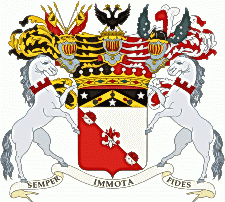Afanasy (Russian : Афана́сий) is the Russian form of Athanasios, a Greek name meaning "immortal". It may refer to:

Russian is an East Slavic language, which is official in the Russian Federation, Belarus, Kazakhstan and Kyrgyzstan, as well as being widely used throughout Eastern Europe, the Baltic states, the Caucasus and Central Asia. It was the de facto language of the Soviet Union until its dissolution on 25 December 1991. Although, nowadays, nearly three decades after the breakup of the Soviet Union, Russian is used in official capacity or in public life in all the post-Soviet nation-states, as well as in Israel and Mongolia, the rise of state-specific varieties of this language tends to be strongly denied in Russia, in line with the Russian World ideology.

Immortality is eternal life, being exempt from death, unending existence. Some modern species may possess biological immortality.
People:
- Afanasy Bagration, Prince Adarnase of Kartli (1707–1784), Georgian prince royal and Russian Empire general
- Afanasy Beloborodov (1903–1990), Russian general
- Afanasy Fet (1820–1892), Russian poet
- Afanasy Grigoriev (1782–1868), Russian architect
- Afanasy Nikitin (died 1472), Russian merchant and traveler
- Afanasy Ordin-Nashchokin (1605–1680), Russian statesman
- Afanasy Razmaritsyn (1844–1917), Russian-Ukrainian painter
- Afanasy Seredin-Sabatin (1860–1921), Russian architect and journalist, first Western architect to live and work in the Korean Empire
- Afanasy Shchapov (1830–1876), Russian historian
Afanasy Bagration, born Adarnase (ადარნასე) was a Georgian prince royal (batonishvili) of the Bagrationi dynasty of House of Mukhrani of Kartli and a natural son of Levan of Kartli by a concubine. He followed, in 1724, his half-brother King Vakhtang VI of Kartli in an exile to the Russian Empire, where Afanasy pursued a military career and attained to the rank of general poruchik.

Afanasy Pavlantyevich Beloborodov was a military commander of the Soviet Army during the Second World War, twice Hero of the Soviet Union and recipient of several other awards. Between 1963 and 1968, he commanded the Moscow Military District.

Afanasy Afanasyevich Fet, later known as Shenshin ; 5 December [O.S. 23 November] 1820 – 3 December [O.S. 21 November] 1892), was a renowned Russian poet regarded as the finest master of lyric verse in Russian literature.
Fictional people:
- Afanasy Ivanovich Tovstogub, the main character of Nikolai Gogol's short story The Old World Landowners

Nikolai Vasilievich Gogol was a Russian dramatist of Ukrainian origin.
"The Old World Landowners", a short story written in 1835, is the first tale in the Mirgorod collection by Nikolai Gogol. A bittersweet and ironic reworking of the Baucis and Philemon legend, it is a simple story that represents the mature Gogol and hints at his later works.
The surname Afanasyev (Russian : Афана́сьев) is derived from the name. The surname Afonin (Russian : Афо́нин) is derived from Afonya, the short form of the name.
Afanasyev or Afanasyeva is a Russian last name. It is derived from Afanasy which is etymologically directly connected to Athanasios (Αθανάσιος), a very common Greek masculine first name that means "immortal". As Russian last name it is shared by the following people:
Afonin is a German surname derived from Afonya, a short form of the name Afanasy. The surname literally means Afonya's. It may refer to:
| This page or section lists people that share the same given name. If an internal link led you here, you may wish to change that link to point directly to the intended article. |








